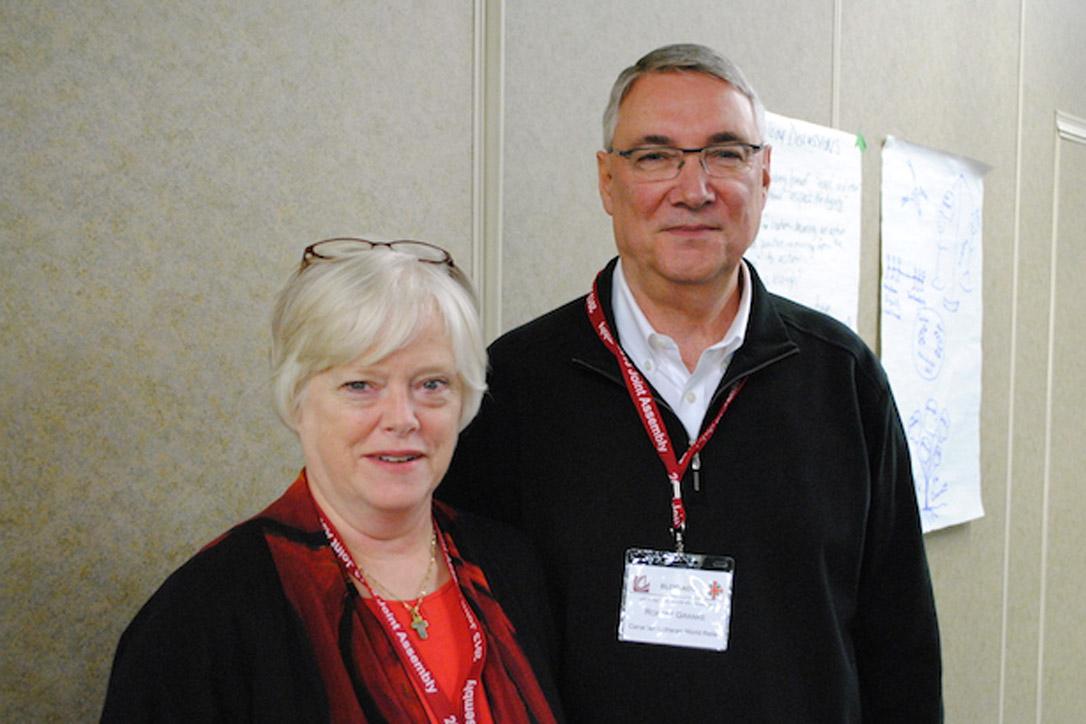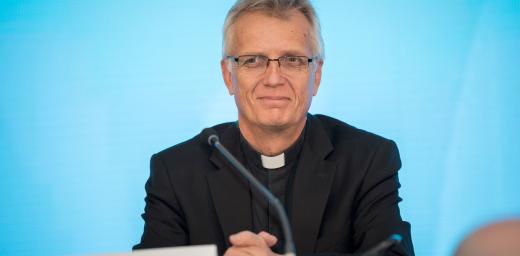Canadian Anglicans and Lutherans put spotlight on refugees

PWRDF director Adele Finney and CLWR director Robert Granke at Canada's National Church Council. Photo: André Forget
Faith communities in Canada encourage sponsorship
(LWI) - The directors of Canadian Lutheran World Relief (CLWR) and of the Anglican organization The Primate’s World Relief and Development Fund (PWRDF) have offered hopeful words about the work their relief and development organizations are doing to help refugees, and a dire prognosis for the refugee crisis as a whole.
“The refugee situation is not going to get better,” PWRDF director Adele Finney told members of Council of General Synod and the Evangelical Lutheran Church in Canada's National Church Council on November 13. “This is where we are now.”
Since the crisis tragically captured mainstream attention in September after the death of three-year-old Alan Kurdi who drowned on crossing the Mediterranean Sea with his family, interest in refugee sponsorship has exploded. Given both the CLWR and 15 Anglican dioceses across Canada hold sponsorship agreements and are therefore eligible to help resettle refugees, resettlement has been a major emphasis of churches’ responses.
But while they were both pleased to see the number of Anglicans and Lutherans willing to step up and welcome refugees into their communities, Finney and CLWR director Robert Granke also stressed the importance of their organizations’ work in conflict zones around the world.
“What we want to say is, ‘remember refugees worldwide’, ” said Finney. “While Syrian refugees have risen in the international view, there are refugees worldwide.”
Granke noted that CLWR is involved in Central and East Africa, helping South Sudanese nationals fleeing to Uganda, Ethiopia and Kenya to escape violence in their own country. It is also working in Jordan, where many Syrians have fled, and in Iraq, which has a high number of internally displaced people.
Resilience programming
“The reality is that a refugee today, when they migrate somewhere, they live in their new home or their new location on average 17 years,” said Granke. “It used to be nine years, but in the last couple of years that has almost doubled in terms of the average.”
This has meant a shift in emphasis for CLWR, moving toward what Granke calls “resilience programming,” which involves helping refugees build a somewhat stable life where they resettle. Canada and Jordan, for example, have agreed to work with CLWR to improve schools attended by refugee children in northern Jordan.
Finney reported that PWRDF has also been involved in aiding refugees in need of long-term care—for example, in the case of refugees fleeing violence in Sri Lanka, some of whom have been in refugee camps for 30 years. PWRDF also supports the Well Child Clinic in Cairo, which is on the front lines of dealing with the massive influx of Sudanese, South Sudanese and Syrian refugees to Egypt.
Increased aid and collaboration
Despite the gravity of the situation, the news is not all bad, Finney said, noting that one of the most important things that organizations like PWRDF and CLWR have been doing is to pool their resources and political influence.
“We’ve taken the collaboration thing seriously,” she said. Finney and Granke work together with a group of 12-15 executive directors of denominationally-based relief and development organizations to increase aid to areas with large numbers of internally displaced people and refugees.
With the new Liberal government—which has pledged to bring 25,000 Syrian refugees into the country by the end of the year —the possibilities have expanded. According to Granke, the government plans to bring in as many as 900 refugees a day in order to meet this goal, and sponsorship agreement holders will play an important role in settling these refugees.
“We’re ready to assist. There are 91 sponsorship agreement holders across Canada, and I think those 91 can take a large number of that 25,000,” he said. “I think we can do this—I have no doubt that that number is achievable.”
The story was first published in Anglicanjournal.com.





